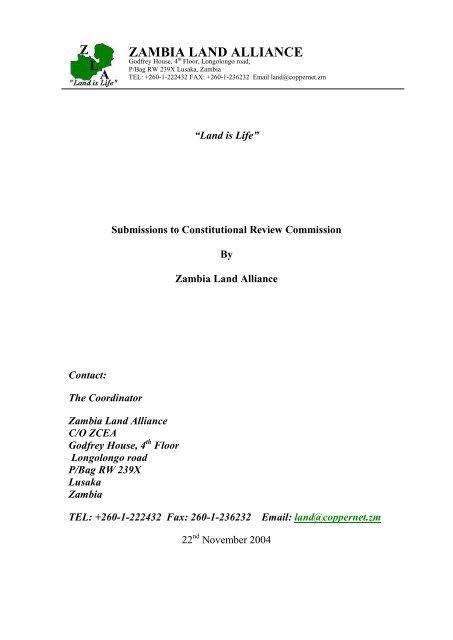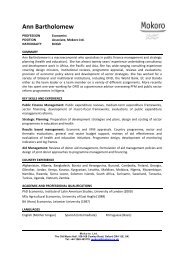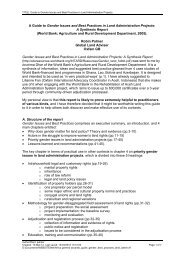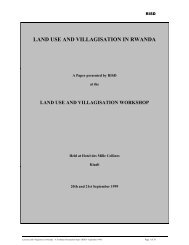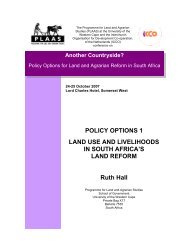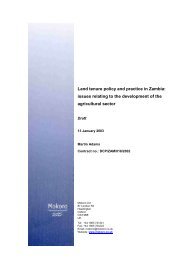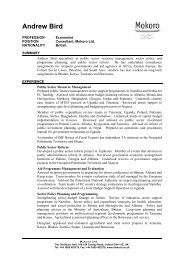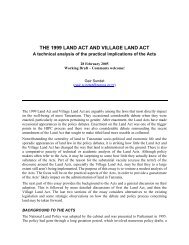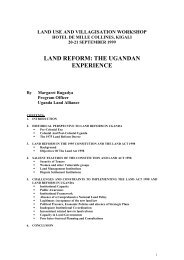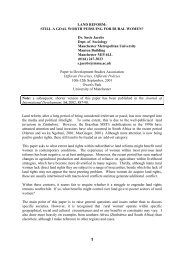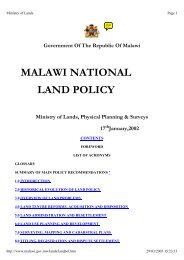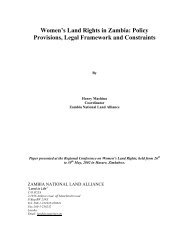ZAMBIA LAND ALLIANCE - Mokoro
ZAMBIA LAND ALLIANCE - Mokoro
ZAMBIA LAND ALLIANCE - Mokoro
You also want an ePaper? Increase the reach of your titles
YUMPU automatically turns print PDFs into web optimized ePapers that Google loves.
<strong>ZAMBIA</strong> <strong>LAND</strong> <strong>ALLIANCE</strong><br />
Godfrey House, 4 th Floor, Longolongo road,<br />
P/Bag RW 239X Lusaka, Zambia<br />
TEL: +260-1-222432 FAX: +260-1-236232 Email land@coppernet.zm<br />
“Land is Life”<br />
Submissions to Constitutional Review Commission<br />
By<br />
Zambia Land Alliance<br />
Contact:<br />
The Coordinator<br />
Zambia Land Alliance<br />
C/O ZCEA<br />
Godfrey House, 4 th Floor<br />
Longolongo road<br />
P/Bag RW 239X<br />
Lusaka<br />
Zambia<br />
TEL: +260-1-222432 Fax: 260-1-236232 Email: land@coppernet.zm<br />
22 nd November 2004
1.0 Introduction<br />
The Zambia Land Alliance (ZLA) is a network of civil society organisations working<br />
with and advocating for land rights of the poor. The Alliance was formed in 1997<br />
following the Zambian Government’s land reform processes which started in the early<br />
1990s.<br />
In 2002, civil society organisations 1 through Zambia Land Alliance came together and<br />
formed the Civil Society Land Policy Review Committee. While working under the<br />
Zambia Land Alliance, the committee’s main purpose was to spearhead civil society’s<br />
participation and input into the review of the Draft National Land Policy being<br />
undertaken by the Ministry of Lands. This committee embarked on a series of<br />
consultations from 3 rd September 2004 to 19 th November 2004 and held meetings at<br />
the Offices of the Zambia Land Alliance located at 4 th Floor of Godfrey House,<br />
Longolongo road, Lusaka, for the purposes of coming up with these submissions. We<br />
now make our submissions as follows:<br />
2.0 SPECIFIC SUBMISSIONS:<br />
2.1 Land as a Right<br />
We, the Civil Society Land Policy Review Committee of the Zambia Land Alliance<br />
believe through our experience, that land is the primary resource that ensures<br />
sustainable livelihoods for most poor men and women in Zambia. The poor depend<br />
on land for food, as a place to sleep on or somewhere to conduct a small business on.<br />
Land is also their source of identify, social status, and power. Land also provides an<br />
opportunity for employment and is also the best security against poverty. To us, land<br />
is what technology or market shares are to the industrialized nations. Land is our<br />
wealth and every government’s common good intentions must be to equitably<br />
distribute its wealth among its people.<br />
It is for this noble reason that the Zambia Land Alliance attaches great importance to<br />
land advocacy, with a motto “land is life”. We therefore would like the next Zambian<br />
constitution to promote equitable and efficient distribution of this important resource.<br />
The current constitution does not adequately protect the poor on customary land. In<br />
addition, the constitution does not promote equity in access, control and ownership of<br />
land. This is evident in many cases where people have been displaced from their<br />
ancestral land to pave way for rich people who used their influence to acquire the<br />
same land with the backing of the law. Such land holders prevent communities from<br />
accessing products and services that were previously obtained from the allocated land<br />
such as medicines, firewood, grazing their animals, hunting and holding ceremonies.<br />
Thus there is conflict over use of resources between communities and investors.<br />
Further, poor people are being deprived of their rights to access water resources<br />
because rich people have acquired land along major rivers and fenced it off.<br />
Further, we acknowledge that the current constitution recognises one’s rights to land<br />
under Article 16 - “property rights”. We recognize that the right to hold property<br />
which includes land (our issue of focus) is a fundamental human right. We however<br />
1 See list at the end of this submission.
observe that this provision is not only inadequate but is also put in technical language<br />
that is difficult for the ordinary person to understand. In addition, Article 16 has such<br />
a broad sweep that it subsumes ‘land’ within ‘property’.<br />
Regarding evictions of poor people, may we refer the distinguished Commission to<br />
the South African Constitution, which in Article 26(3) prevents any person from<br />
arbitrary eviction from their land. We further observe that some individuals and<br />
companies leave their land idle for too long while the poor do not have land for<br />
survival. The poor are forced to live on such pieces of land for many years without<br />
being disturbed, but are later forcedly evicted from such land.<br />
To this effect we submit to this Commission that the new Constitution provides<br />
an explicit clause in the Bill of Rights with a focus on land to make this very<br />
distinct as core to sustainable development. In doing so the constitution must<br />
clearly state that every Zambian citizen has a right to land and further state the<br />
mechanism under which this provision will be regulated to ensure equitable<br />
distribution of land so that this resource does not fall in the hands of few<br />
individuals at the expense of the poor majority.<br />
Additionally, we demand that there be a clause in the constitution which states<br />
that “a law shall be passed to provide and ensure equitable access and<br />
distribution of land to the Zambian citizens.”<br />
Furthermore, the constitution should provide for the right of occupancy and<br />
protection for people who have lived on a piece of land undisturbed for ten (10)<br />
years or more.<br />
2.2 Women’s Rights to Land<br />
Distinguished Commissioners, it is clear that in both customary and formal tenure<br />
system, women are marginalised in accessing, owning and controlling land in Zambia.<br />
Records at the Deeds Registry of the Ministry of Lands confirm the patriarchal nature<br />
and pattern of men’s dominance in land ownership in Zambia. This continues to<br />
happen despite women being the main produces of food on the land.<br />
Moreover, although human rights are recognised, and respected in the Constitution,<br />
our constitution does not provide for affirmative action to address the needs of<br />
women, people with disabilities, HIV/AIDS infected people, and other disadvantaged<br />
groups with regard to land. Instead, while seeking to protect women’s rights, Article<br />
23 of our constitution does not absolutely prohibit discrimination. It allows<br />
discrimination in the private sphere on the basis of marital status, sex and distribution<br />
of resources. Further, discriminatory customary and personal laws such as those<br />
relating to marriage, divorce, burial and devolution of property are allowed.<br />
Therefore since most customary laws are discriminatory against women, women do<br />
not enjoy the benefits of this clause.<br />
May we request this distinguished Commission to take a leaf from the Namibian<br />
Constitution on this important issue of women’s rights. Article 23 (3) of the<br />
Namibian Constitution clearly states thus: “… it shall be permissible to have regard<br />
to the fact that women in Namibia have traditionally suffered special discrimination
and that they need to be encouraged and enabled to play a full, equal and effective<br />
role in the political, social, economic and cultural life of the nation.”<br />
Further, Article 7 (4) of the South African Constitution categorically puts it that<br />
“No person may unfairly discriminate directly or indirectly against anyone on one or<br />
more grounds in terms of subsection (3). National legislation must be enacted to<br />
prevent or prohibit unfair discrimination.”<br />
Our submissions to this distinguished Commission therefore are that:<br />
Article 23, clause (4)(c) and (d) of the current constitution must be<br />
repealed to ensure there is no discriminatory clause that can be twisted to<br />
disadvantage women.<br />
A separate provision for rights of women be made in the Bill of Rights.<br />
In order to correct the current gender imbalance in accessing, owning and<br />
controlling land, the Constitution must provide for affirmative action –<br />
measures that encourage women’s access, ownership and control over<br />
land, and participation in decision making processes.<br />
We urge this distinguished Commission to take a leaf on the Namibian,<br />
the Ugandan and the South African Constitutions as these elaborate more<br />
on women’s rights.<br />
2.3 Vestment and administration of land<br />
Distinguished Commissioners, ALL land in Zambia is vested in the hands of the<br />
President for and on behalf of the people of Zambia. The Commissioner of Lands acts<br />
on behalf of the President in implementing this provision. However, vesting of ALL<br />
land in the President, opens the administration system to abuse and to the<br />
disadvantage of the people whom the laws purport to protect.<br />
If we may refer the distinguished Commission to the Ugandan constitution over this<br />
matter. The Ugandan Constitution in Chapter 237 (1) clearly states that “Land in<br />
Uganda belongs to the citizens of Uganda and shall vest in them in accordance with<br />
the land tenure systems provided for in this Constitution.”<br />
In this regard, we submit to this distinguished Commission that all land in<br />
Zambia be vested in the state in perpetuity. We wish to further propose that<br />
there be a provision to establish a National Land Council to deal with matters of<br />
land, with district and community/village committees as its agents. This is in line<br />
with Zambia’s Decentralisation Policy.<br />
Further, the National Land Council should comprise representatives of persons<br />
with disabilities, youth groups, child headed households, people living with<br />
HIV/AIDS, women’s movement, traditional leaders, Parliament, private sector,<br />
academic institutions, the church, relevant Government departments and any<br />
other relevant institutions.<br />
2.4 Conversion of customary land to leasehold tenure<br />
Distinguished Commissioners, the current land law (the Lands Act, 1995) provides<br />
for conversion of customary land to leasehold tenure, upon written consent from the
chief under whose jurisdiction the land lies. However, once the land has been<br />
converted to leasehold tenure, no mechanism exists to convert it back to customary<br />
tenure should the need arise. This in effect, means that all land that is converted, shall<br />
forever remain within the domain of leasehold tenure, thus depriving future<br />
generations of customary land, which is a birth right. Further, allowing only one<br />
person (the Chief/Chieftainess) to consent conversion of land opens that to abuse.<br />
Further, some institutions and individuals have too much land and they continue to<br />
acquire more at the expense of others. There is no limit as to how much land they<br />
should acquire.<br />
Additionally, many young people are denied land because they are below 21 years<br />
old, the minimum age for qualification. This is so despite the major role that many<br />
young people are playing today in looking after families. Further, it must be noted<br />
that the majority of people in Zambia are youths.<br />
We `demand therefore are that:<br />
<br />
<br />
<br />
The conversion of customary land to leasehold tenure must only happen<br />
with the express consent of all adult women and men in a particular<br />
community at a decision taken in a public meeting whose minutes are<br />
publicly available.<br />
Second, the new constitution must provide for passing of a law that limits<br />
the size and number of parcels of land each individual or institution<br />
should have.<br />
We further submit that a clause be provided in the constitution that<br />
upholds individual rights to own land at an appropriate age less than 21<br />
years. This will facilitate young people to own land in that with the<br />
coming of HIV/AIDS, more and more are currently looking after families.<br />
2.5 Land and the Environment<br />
Distinguished Commissioners, most practices in the agricultural, mining, forestry and<br />
tourism industries in Zambia today do not promote environmental protection hence<br />
lead to land degradation.<br />
We submit that our constitution provides for Parliament to enact a law that<br />
provides for measures intended to protect and conserve the natural environment<br />
from destruction through pollution and unsustainable land use practices for the<br />
benefit of both the current and future generations. The law should further<br />
promote a broad based participatory framework in which the state, private<br />
sector and communities are involved in partnership in the management of land<br />
and the environment.<br />
2.6 Land Information<br />
Distinguished commissioners, the current land administration system is not<br />
transparent and accountable enough to the public. Procedures for acquiring land are
too long, cumbersome, complicated and costly to the poor. Many people do not know<br />
where to go when they want to acquire land or have their dispute resolved. They are<br />
not told who has been offered land because relevant government institutions do not<br />
provide such information. Zambians have the right to information on land.<br />
To address this problem, we demand that the constitution gives a direction to<br />
replace the current Lands Act of 1995 with a law that contains adequate<br />
provisions on transparency and accountability in the land administration<br />
especially in the Ministries of Lands and Local Government.<br />
2.7 Mode of Adoption of the Constitution<br />
In conclusion, we note with sadness the number of Constitutional Review<br />
Commissions that seem to be an obvious event with each new national administration.<br />
This continues to cost the nation dearly and depriving the poor of resources to<br />
eradicate poverty. Also considering the universal desire by all sectors of our society<br />
(government, the public, civil society, the church, private sector and from every part<br />
of Zambia) to have a constitution that will stand the test of time, we demand, that<br />
once this exercise is done the draft constitution must be adopted through a<br />
Constituent Assembly.<br />
This will allow at least for once, all Zambians to have a hand through broadened<br />
representation, in the debate and adoption of the supreme law of the land. The<br />
resulting document will then be said to have taken into account the needs and<br />
aspirations of all Zambians through their representatives.<br />
WE THANK YOU DISTINGUISHED COMMISSIONERS<br />
<strong>ZAMBIA</strong> <strong>LAND</strong> <strong>ALLIANCE</strong><br />
Members of the Land Policy Review Committee<br />
1. Catholic Commission for Justice Development and Peace (CCJDP)<br />
2. Community Based Natural Resource Management and Sustainable<br />
Development (CONASA)<br />
3. Environmental Conservation Association of Zambia (ECAZ)<br />
4. Green Living Movement (GLM)<br />
5. Integrated Rural Development initiative (IRUDI)<br />
6. Land and Development Association (LADA)<br />
7. National Association for Peasant and Small-Scale Farmers (NAPSSF)<br />
8. PANOS Southern Africa<br />
9. Programme Against Malnutrition (PAM)<br />
10. Steadfast Action Foundation (SAF)<br />
11. Transparency International-Zambia (TIZ)<br />
12. Women for Change (WFC)<br />
13. Women in Law in Southern Africa (WLSA)<br />
14. Zambia Alliance of Women (ZAW)<br />
15. Zambia Association for Research and Development (ZARD)<br />
16. Zambia Civic Education Association (ZCEA)<br />
17. Zambia Land Alliance (ZLA) – Coordinating body


